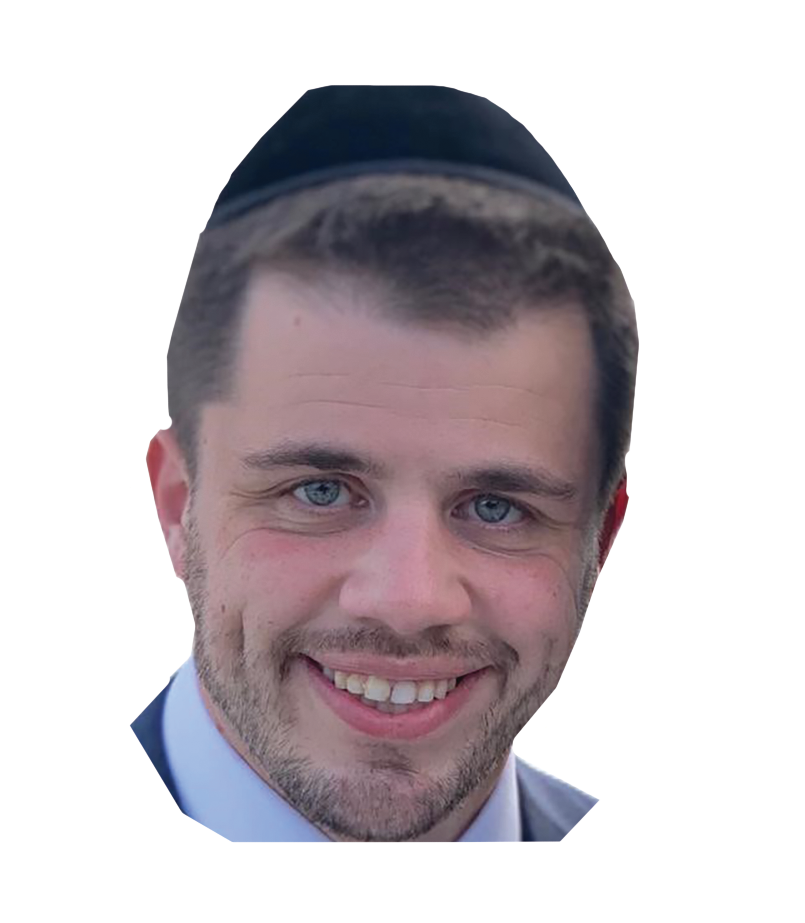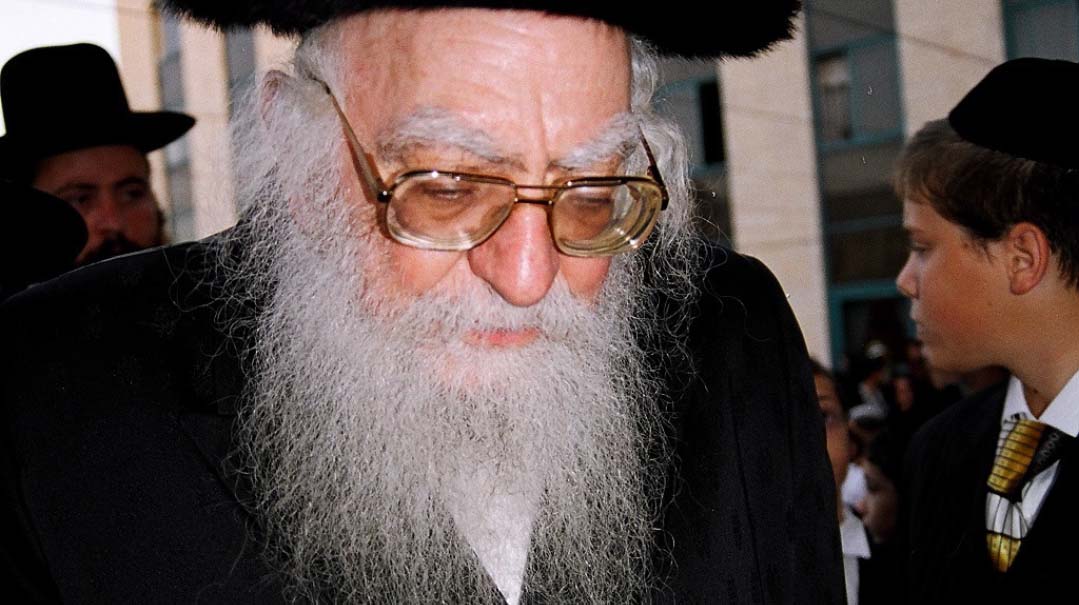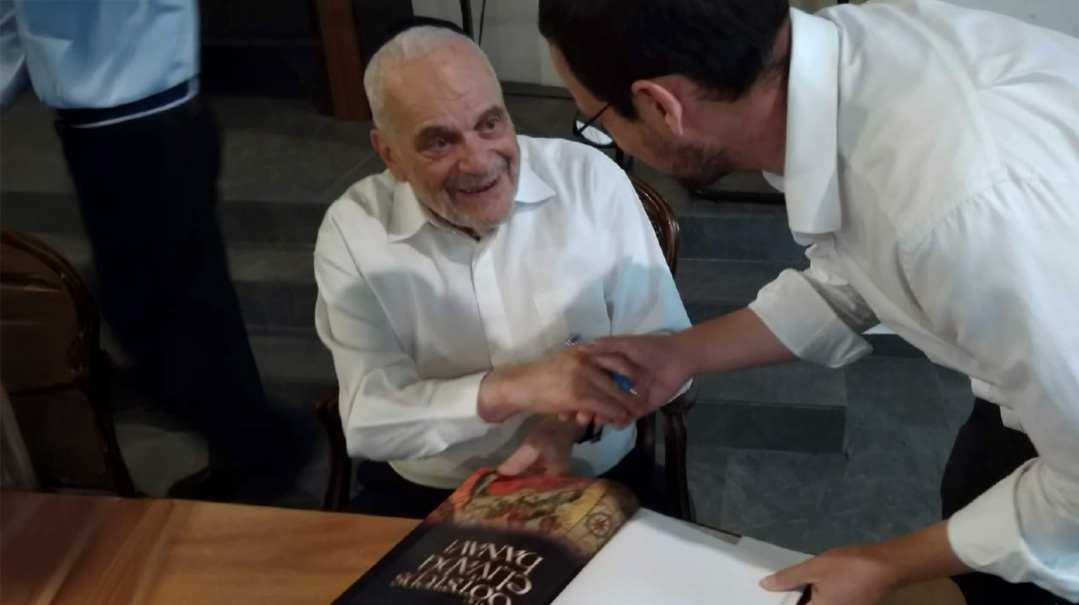Blinded by his Glow

In Tribute to Rav Shlomo Fischer Ztz”l

Prepared for print by: Dovi Safier
Adapted from the Divrei Hesped delivered by Rav Lipa Geldwerth
At the levayah of Rav Berish Zuckerman, an eminent Torah scholar, Rav Moshe Feinstein delivered a hesped. I still remember his words, because he delineated two distinct types of greatness. There are gedolim, he said, known by the masses — and then there are gedolim who are known primarily by other gedolim.
With the passing of Rav Shlomo Fischer, Rosh Yeshivas Itri, renowned halachic decisor, and author of the Beis Yishai, just two months shy of his 90th birthday, we have just lost the second sort of luminary: the sort of gaon known and understood only by other geonim. It’s only a small cadre who can appreciate the staggering loss of this mighty intellect and towering scholar.
Rav Moshe Shapira, a stellar gaon himself and not someone who was easily impressed, would say that Rav Shlomo “looms seven dargos (levels) above the world’s greatest lomdim.” Rav Shmuel Auerbach described him as “gevadig in der Velt — out of this world.” Maran Rav Chaim Kanievsky rose when a visitor identified himself as one of Rav Shlomo’s talmidim.
When Rav Shlomo was just 12 years of age, the Mir Rosh Yeshivah, Rav Leizer Yudel Finkel, noticed his extraordinary genius and invited him to join a special chaburah in the Mir that included far older bochurim, the likes of Rav Mendel Atik and Rav Chaim Greineman. The Brisker Rav extolled the divrei Torah shared by the young Rav Shlomo and once spent close to an hour pondering a kashe he’d raised on a famous Rav Chaim, commenting, “I don’t know if my father would have had a resolution…” In a letter written to Rav Shlomo, the Steipler Gaon addressed him with the reverence typically reserved for a senior Torah scholar.
Chazal reference an attribute known as “ziv hachachmah — the glow of wisdom,” upon which Rashi comments: “I do not know what this is.” The Tosafos Yom Tov is understandably perplexed by Rashi’s “not knowing.” Perhaps Rashi is telling us that there is a glow so dazzling, so blinding, that we cannot perceive it clearly enough to define it. This is how one feels when attempting to describe Rav Shlomo’s greatness.
In addition to his brilliance in Shas and poskim, Rav Shlomo had absolute mastery of every area of Torah. His total recall of Tanach and its most obscure mefarshim was no less than his bekius in all Midrashim and targumim, the Moreh, as well as all kadmonim (he edited the current print version of Rav Chasdai Crescas’s Ohr Hashem). His instant recall of Zohar Hakadosh and kisvei Ari ztz”l — including tomes of sifrei HaMekubalim, particularly the Leshem — was spectacular. His singular expertise in all kisvei HaGra was legendary (as a 28-year-old, he elucidated the manuscript of the Gra on the Sifra, and at 31, the Likutim in Kabbalah). The history surrounding each sefer and every mechaber was at his fingertips. His knowledge of the body of sifrei drush and chassidus, experts say, was amazing. His own koach hadrush as captured in his Beis Yishai was astounding.
But his life, in almost all of his waking hours, was characterized by his single-minded devotion to Shas b’iyun. He was immediately conversant in all its Rishonim and (even latter day) Acharonim, including every kneitsch in any Rav Chaim and Brisker Rav. He possessed a staggering command of, and reverence for, the Chazon Ish.
His lightning-quick comprehension of the most complex sugyos and his perception of the most intricate halachic calculations were breathtaking. His luminously creative chiddushim, grounded in the methodology of the great roshei yeshivah, were equally brilliant. Over a period of nearly 40 years, he delivered Friday morning and Motzaei Shabbos shiurim to a special chaburah, and he completed all Ketzos (and Nesivos), Avnei Miluim, Shev Shmattsa, Shailos Tshuvos Rabi Akiva Eiger, and Mikdash Dovid, among other works.
Rav Shlomo’s mythical genius was perhaps only outdone by his storybook hasmadah. For almost 60 years he slept in yeshivah dormitories — first in Rav Yissachar Mayer’s Yeshivas HaNegev and then in Rav Mordechai Elefant’s Yeshivas Itri — coming home only for Shabbos. His “room” there, for many years, was no more than a four walled bookcase with a carved-out space for him and a chavrusa to stand by his shtender (he would never sit when learning), the only decor being a shelf piled impossibly high with thousands of letters addressed to him from all over the world, from all circles, including academic scholars. He made himself available to all who turned to him, to the degree that many cite him as their “mentor,” one of the prices he paid for his extraordinary generosity and humility.
His bed was hidden somewhere beneath a pile of seforim along with an old suitcase crammed with scores of notebooks filled from cover to cover with his handwritten novella. Today, some of those chiddushim appear in his monumental two-volume work, Beis Yishai (one entailing a fraction of his shiurim on sugyos HaShas and the second containing a selection of his numerous derashos).
My first encounter with Rav Shlomo took place in Elul 5731 (September of 1971) when I was a yeshivah bochur studying in Yerushalayim. Shortly after my arrival, I received a call from Rav Yisroel, the son of Rav Simcha Zissel Levovitz. His father was in the final stages of the publication of the maamarim of his own father, Mirrer Mashgiach Rav Yerucham Levovitz — what would be known as the Daas Torah — and there were five sources that were eluding him.
“There is this fabulous baki named Rav Shlomo Fischer who lives in a yeshivah dorm,” Rav Yisroel told me. “Go ask him for his help locating these sources, please.”
I found Rav Shlomo’s room, and through the window I saw him at his shtender, deeply absorbed in his learning. With trepidation, I knocked on his dorm door, which he abruptly swung open. Then he asked what I needed. I blurted out “mareh mekomos” and he responded, “Nu.” I nervously listed the five elusive sources that just couldn’t be tracked down.
“Of course they can’t find them,” he told me, “the notes they’re using are citing them incorrectly.” He proceeded to rattle off three gemaras and one Rus Rabbah. The fifth, he admitted, was a problem. Thinking for a while, tapping his temple, he muttered: “Not a Bavli … not a Yerushalmi … not in the Midrash, but the vernacular sounds like the language of Rabbeinu Yonah in one of his hakdamahs.”
The door closed, and suddenly the meeting was over. (That fifth mareh makom turned up in the forward to Sefer HaYirah.)
Years later when I was a yungerman again living in Yerushalayim, Rav Hillel David was visiting, and I wanted to show off my rebbi to him, since over the years he had heard so much from me about Rav Shlomo. To my utter dismay, on this day, Rav Shlomo’s response to each and every query was an “I don’t really know” or “I can’t say.” I was crestfallen. What had happened?
Upon leaving, I was about to apologize when Rav Hillel said, “You told me about his gaonus, but you didn’t tell me about his tzidkus.” Then he explained. “You see, today is Erev Rosh Chodesh, Yom Kippur Katan. You didn’t notice, but I did — Rav Shlomo’s breakfast and lunch were sitting there untouched. He is surely fasting and simply has no koach.”
A few weeks later, Rav Hillel proved correct. I returned with my long list of sh’eilos, and again I strangely left empty-handed. It was once again Erev Rosh Chodesh.
With time, I came to learn more about Rav Shlomo’s tzidkus, his unusual piety. In addition to his fierce punctiliousness when it came to halachah, his renowned brother-in-law Rav Chaim Sholom Porush attested that “he [Rav Shlomo] doesn’t know this parshah called middos; he has no nisayon of kinah (envy), no craving for taavah (sensory pleasures), and absolutely no appetite for kavod (honor). He doesn’t know what they even are.”
His passion, instead, was for the middas ha’emes in every aspect of his daily existence — from learning to human relations. He had an all-encompassing love for Torah and lomdei Torah above all and zealously defended the kevod haTorah. When, in an ugly moment, a political party attempted to embarrass its opposition by printing huge placards depicting the early days of a saintly baal teshuvah counted among its ranks, the otherwise shy and reticent Rav Shlomo called for a public gathering at which he then fiercely protested the public shaming of a devout Jew.
While he had a keen understanding of his own world and all its actors, due to his uniqueness, he was not always well understood. His shitos were his pure daas Torah and never kowtowed to the demands of political correctness. When someone once asked me how Rav Shlomo can choose to be so unfettered by the constraints and expectations of mainstream society, I responded, “Cars follow traffic lights, helicopters soar above.”
One day near the end, when he was confined to a hospital bed, his son overheard him speaking to himself. He listened carefully and discovered that amid his delirium, Rav Shlomo was delivering a complicated shiur on Yevamos. He inhaled Torah until his last breath.
Through his entire life, we could never fully perceive the intensity of his brilliant glow. Now, with his passing, bateil ziv hachachmah. We are left in the dark.
(Originally featured in Mishpacha, Issue 887)
Oops! We could not locate your form.






